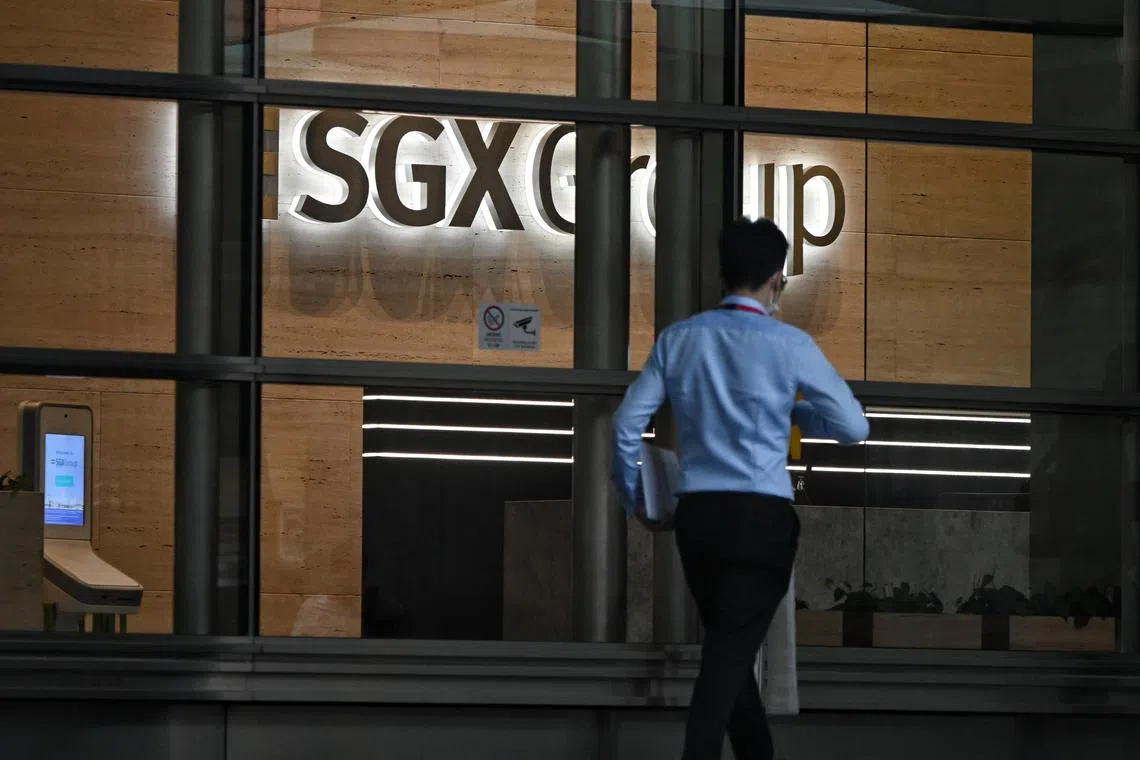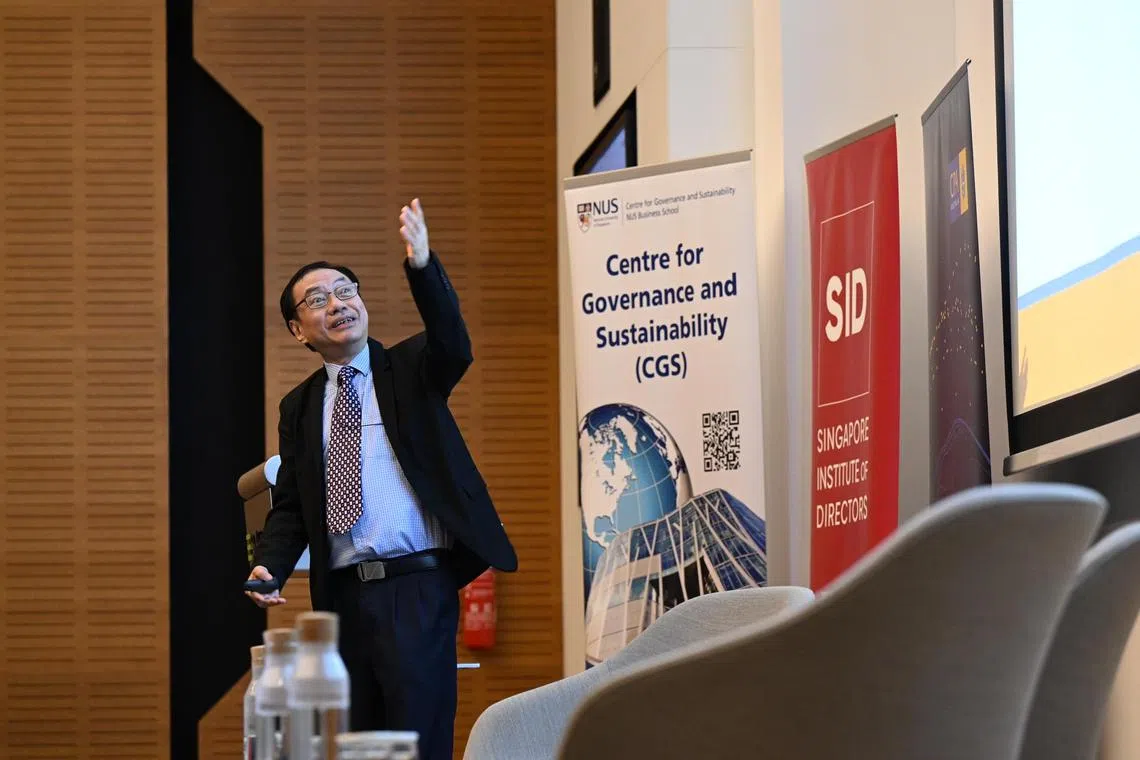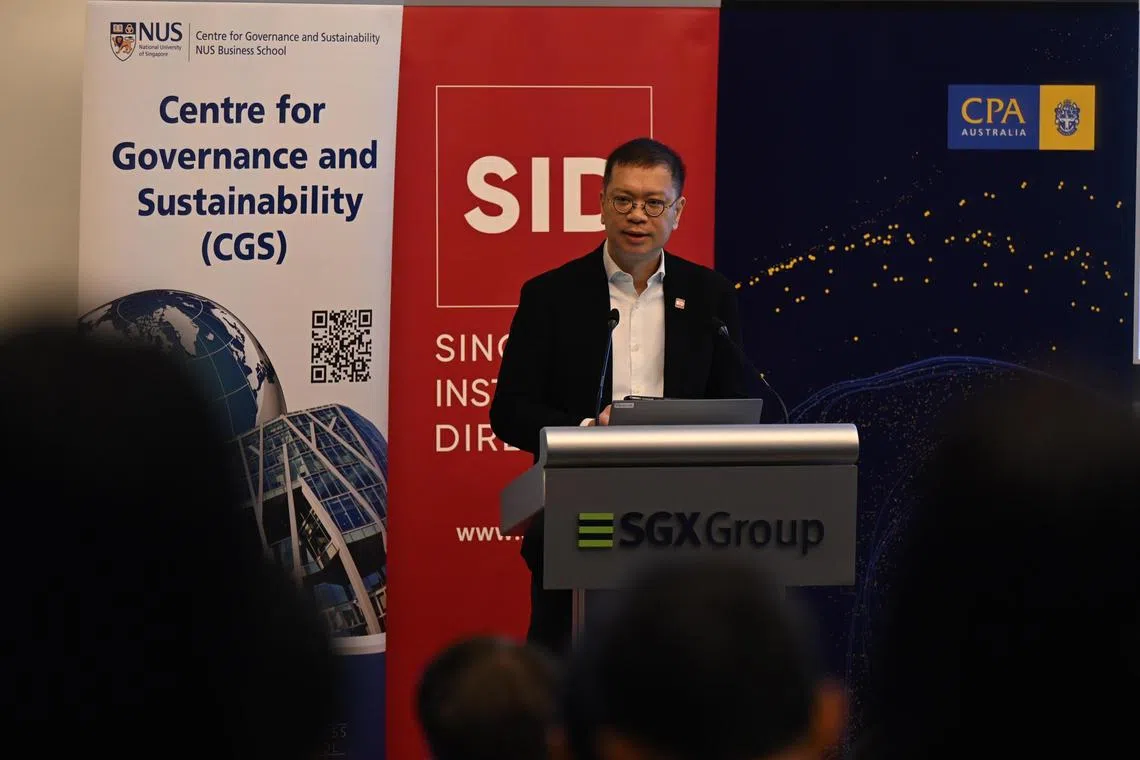Listed companies and trusts show progress in corporate governance practices; some areas still lacking
Sign up now: Get ST's newsletters delivered to your inbox

The Singapore Governance and Transparency Index scores of companies in the general category increased to 74.8 points, in 2023, from 70.6 points.
ST PHOTO: KUA CHEE SIONG
SINGAPORE – Listed companies and trusts continue to improve in the areas of governance, sustainability and transparency practices, noted a new study.
It showed that the Singapore Governance and Transparency Index (SGTI) scores of companies in the general category increased to 74.8 points in 2023, up from 70.6 in 2022.
This is the second year in a row that the score has been above 70. It also represents the largest quantum increase since 2020, when the rating jumped 8.6 points from 2019.
Professor Lawrence Loh, director of the Centre for Governance and Sustainability at NUS Business School, said the overall improvement reflects ongoing efforts by companies to promote good corporate governance practices.
The SGTI score for listed real estate investment trusts (Reits) and business trusts rose to 89.3 points, the fourth straight year that the mean score has been above 80.
The mean score progressed from 84.8 in 2020 to 89.3 in 2023, an increase of 4.5 points.
The SGTI is a collaboration between CPA Australia, the Centre for Governance and Sustainability and the Singapore Institute of Directors.
The study, released at the Governance & Transparency Forum held at the Singapore Exchange on Wednesday, assessed 474 listed companies in the general category and 43 in the Reit and business trust segment, all of which had released their annual reports by May 31.

Singtel was top in the general category in the Singapore Governance and Transparency Index.
PHOTO: ST FILE
Singtel reclaimed the top spot in the general category from ground handling and catering provider Sats.
The telco held pole position from 2015 to 2019 before falling to second spot in 2020 and 2021 and third in 2022.
In 2023, Sats was tied in second place with DBS Group Holdings.
UOB remained in fourth place while OCBC Bank and Singapore Post, which were tied at seventh in 2022, both dropped to eighth this year.
Prof Loh said he was heartened by the improvement in the proportion of companies disclosing stakeholder engagement practices, one of the five pillars considered in the SGTI scoring.
“This actually reflects the emphasis by companies on sustainability,” he said, noting that the focus on stakeholders means firms are going beyond shareholders to look at “other entities, community, customers, employees, regulators, the full array of entities that you need to deliver your value to”.
“Sustainable business practices will be most crucial for long-term value creation and stakeholder trust.”

Prof Lawrence Loh, director of the Centre for Governance and Sustainability at NUS Business School, said the overall improvement reflects ongoing efforts by companies to promote good corporate governance practices.
ST PHOTO: AZMI ATHNI
But there is room for improvement for companies in the general category, given that the mean scores for two pillars in the SGTI rating – “board responsibilities” and “disclosure and transparency” – remained below 70 per cent.
The SGTI scores “board responsibilities” on factors including a firm’s board size, the number of independent directors and whether it has a board diversity policy.
“Disclosure and transparency” looks at whether firms release their audited financial results in a timely manner and if they disclose related-party transactions and interested-person transactions, among other factors.
Those in the Reit and business trust category generally scored better than their peers in the general segment in all areas, including “board responsibilities” and “disclosure and transparency”.
CapitaLand Ascott Trust maintained its top position in the Reit and business trust category, while Far East Hospitality Trust rose to No. 2 and CapitaLand Ascendas Reit fell to third.
CapitaLand India Trust was fourth – its first time in the top five – pushing CapitaLand Integrated Commercial Trust down to fifth.
Mr Tan Boon Gin, chief executive of Singapore Exchange Regulation (SGX RegCo), told the forum that it has taken steps to encourage companies to renew and refresh their boards to ensure they have the necessary skills, talents, experience and diversity.
SGX RegCo amended the listing rules in January
Listing rules were also amended in January 2022 to require listed issuers to put in place a board diversity policy that addresses gender, skills, experience and any other diversity issues.

SGX RegCo CEO Tan Boon Gin said the regulator has taken steps to encourage companies to renew and refresh their boards.
ST PHOTO: AZMI ATHNI
Mr Tan warned directors against “playing musical chairs” by swopping positions across companies.
He said nominating committees should evaluate the performance of their directors every year to ensure they still bring benefits to the boards they sit on.
He added that SGX RegCo is actively engaging with issuers on how they can make appropriate and timely disclosures, noting: “This is a work in progress. But... in the past year, we have already seen an encouraging decrease in the number of queries that we have had to pose to our listed companies.”
Mr Cheung Pui Yuen, Singapore divisional president of CPA Australia, said that in these times of rapid disruption and volatility, “achieving a high level of corporate governance and sustainability has become a necessity, rather than an option”.
“This is an ongoing journey and all stakeholders – regulators, directors, management, investors, industry groups and professional bodies – have to stay the course in this journey.”


